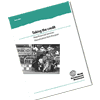
 |
|
||||||||
| Tratados comerciales Unión Europea - América Latina | |||||||||

| Taking the credit : How financial services liberalisation fails the poor. | ||||
|
Today, the World Development Movement warns that Gordon Brown’s proposals at the G20 to salvage the global economy could be wrecked by contradictions between his tough talk on re-regulating the banking sector and the UK’s continued push for banking liberalisation in developing countries through European free trade deals.
Benedict Southworth, director of the World Development Movement said : "On the one hand, Gordon Brown has developed a mantra of tough talk on the re-regulation of banks. On the other, together with other European leaders, he is aggressively pushing free trade deals which demand that developing countries follow a deregulated and liberalised banking model. That model has clearly and spectacularly failed here and has also failed poor people in the developing countries. This is a huge contradiction that threatens a positive outcome at the G20 – and undermines development in poorer countries. "If Brown continues to push for these contradictory policies, he will find his credibility in tatters and risks being branded a hypocrite by those who have concerns over the unfair nature of proposed European and WTO trade deals." The research for ’Taking the credit’ was conducted by the World Development Movement and partner organisations based in Mexico and India. Dharmendra Kumar, from India FDI Watch said : "There are several problems with the current lending regime in India. One is that it is almost impossible to get a loan. The second is that the interest rates are frequently phenomenal and at predatory rates. The aggressive penetration of European banks is going to worsen the situation." In Mexico, Adriana Labardini, director of Centro de Investigación del Consumo y el Consumidor said : "It is heartbreaking to witness in the 21st century, a community of hard working, honest and productive Mexican women that have proven to be credit-worthy and committed entrepreneurs, being excluded by the commercial banks." The report examines the consequences of the entry and presence of European banks in developing countries, including Mexico and India. It concludes that :
The World Development Movement calls for the UK to attend the G20 summit with progressive economic policies including commitments to :
Notes to editors Aside from the proposed trade deal at the World Trade Organisation, the EU is targeting 34 countries in Latin America, Asia and the Mediterranean region for bilateral or regional trade deals. These countries are home to 2.3 billion people, 920 million of whom live on less than US$2 a day.
| ||||
Enlazando Alternativas | Red Birregional UE - ALC | 2007 |
||||



